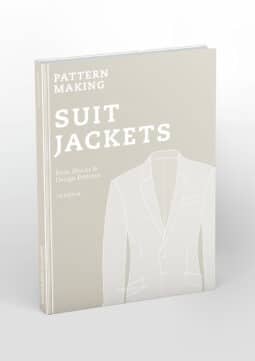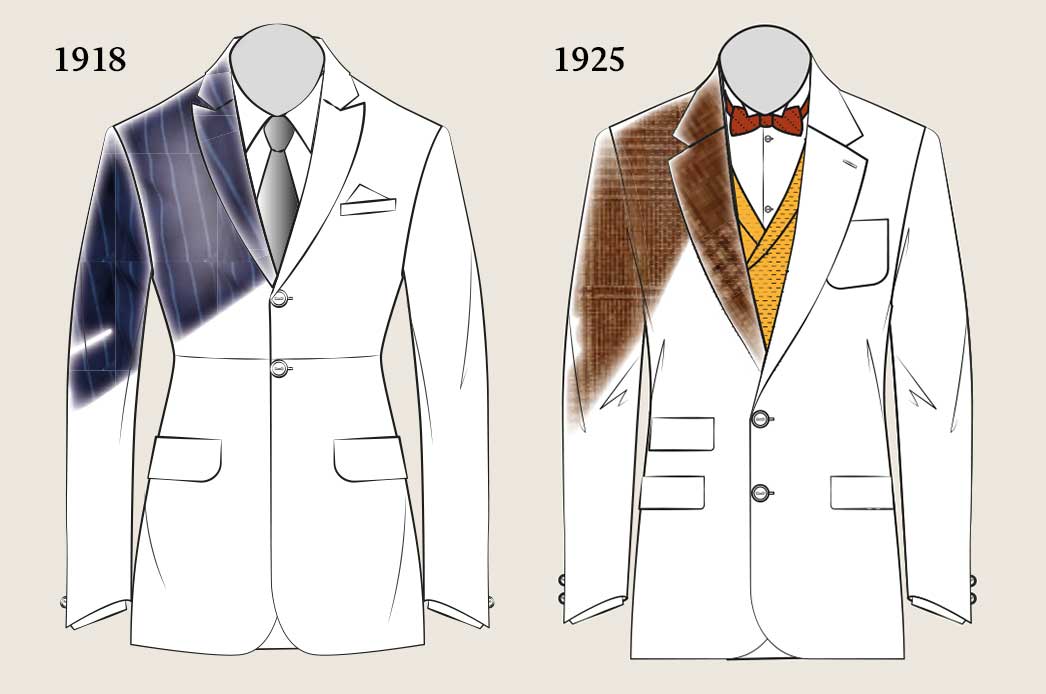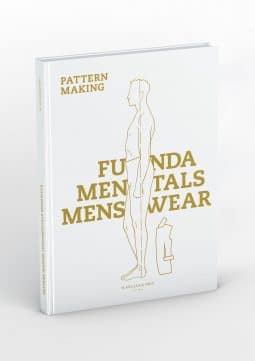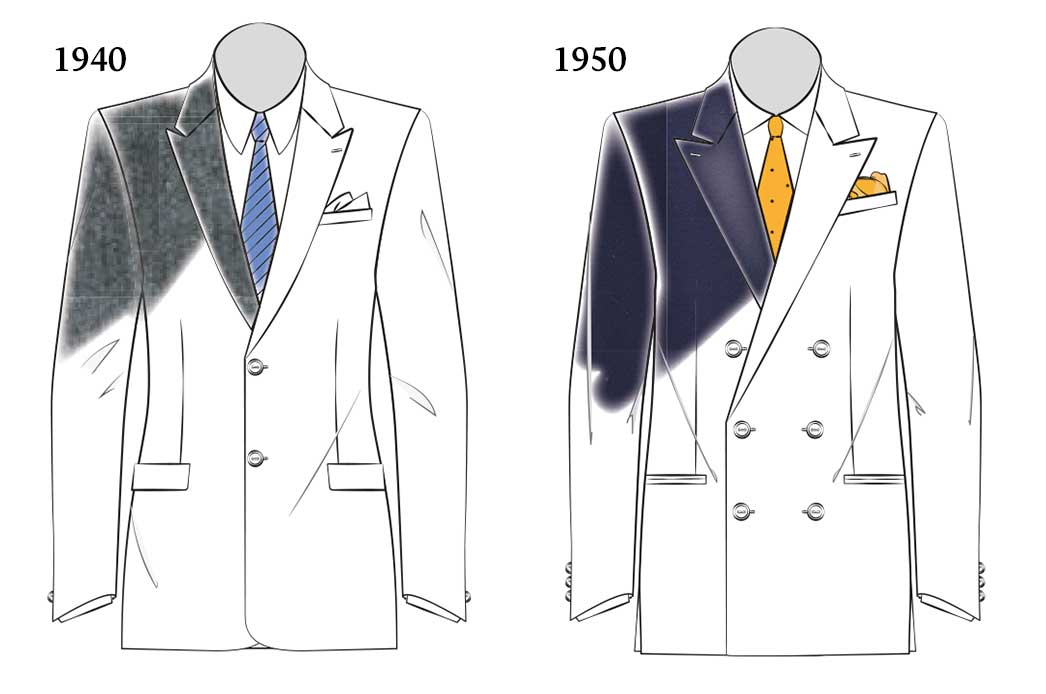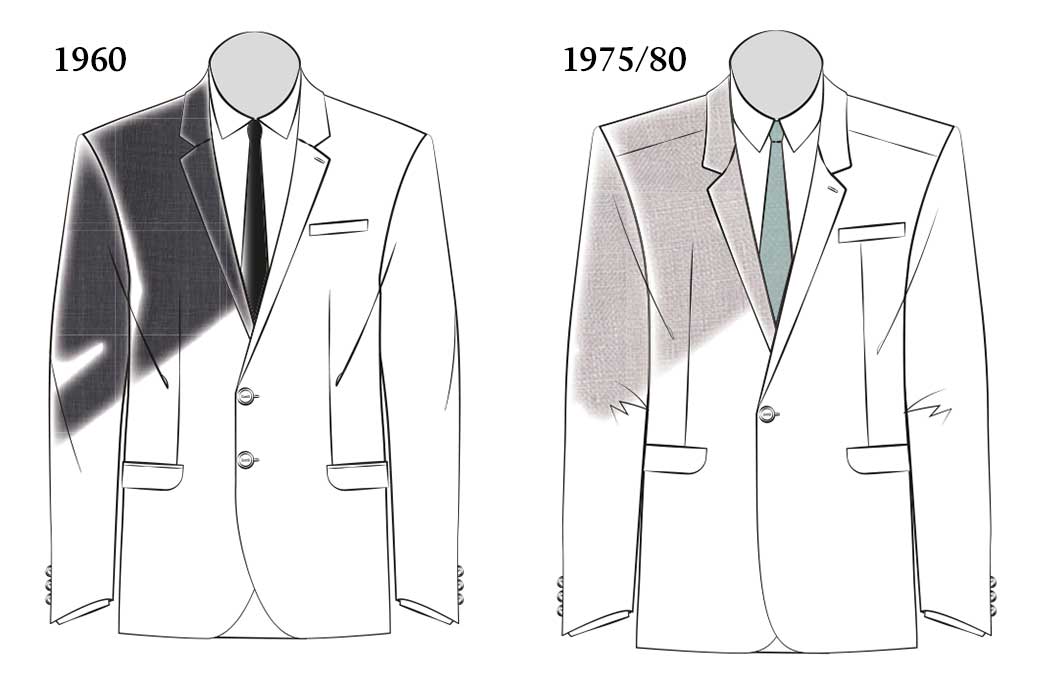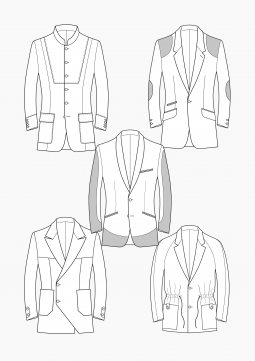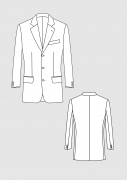The men’s jacket through the ages
Deutsch
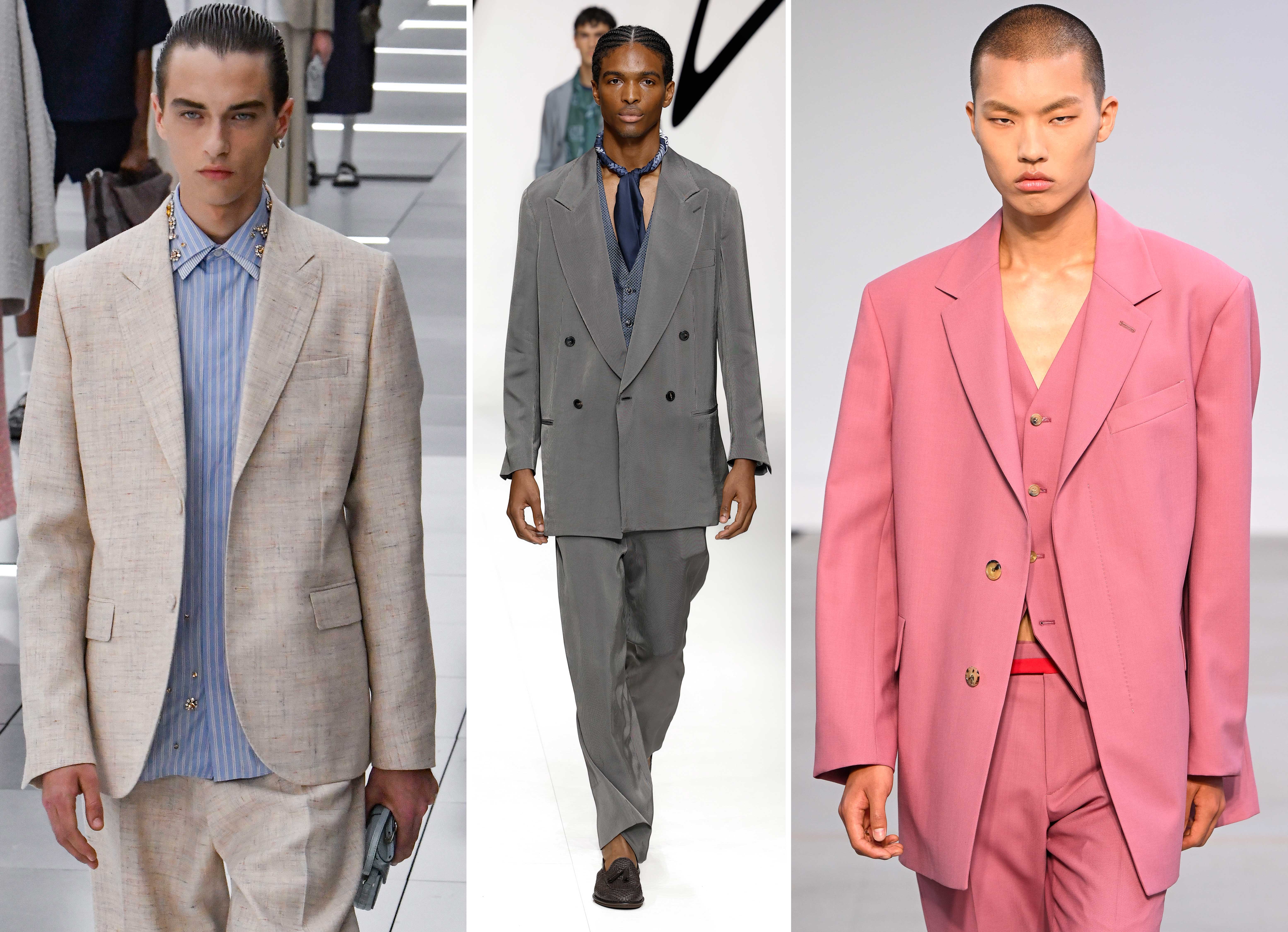
For a long time, the jacket was considered the basic outerwear in men’s fashion. Today, it is increasingly being supplanted by casual sportswear and streetwear. Is the jacket already history? At least it has made history, because to this day the garment is equated worldwide with power and wealth.
1918
After the First World War, an “international look” was the order of the day in German men’s fashion: the patterns had to be elegant and very narrow. For the wearers, this trend meant that they had hardly any freedom of movement, especially in the shoulder area, because in some cases the inside of the jacket was glued with bone glue. The lapels of the jackets were somewhat wider and rising, but not particularly long. This was also due to the fact that the upper of the two fastening buttons was very high up, just below the chest. Equally high was the waist. From there, the jacket fell into a so-called bell-shaped lap. It was relatively short, so that the then new-fashioned pleat of the corkscrew trousers was visible, but the buttocks always remained covered. The jacket itself was usually made of herringbone or pinstripe fabric.
1925
In the middle of the golden decade, the shape of the jacket changed: it lost its bell shape and became more boxy. The look was much sportier as gentlemen craved more flexibility. Especially in the late 1920s, a new pattern technique was used and a larger roll width around the armhole to allow the wearer more movement: The shape of the jacket was thus no longer worked only over the front edge, but also over the armhole. At the same time, they wanted to emphasise masculinity, which is why the shoulder area was padded with cotton wool. The lapels also became more opulent. To enhance this broad look, the less fitted jacket was combined with a waistcoat, which was clearly visible at the neckline and often stood out from the jacket with eye-catching patterns. A love of colour was considered a sign of prosperity, which was also evident in the colourful ties and bow ties of the time.
1940
During the war there was a shortage of everything, including materials. Old garments were cut up and reassembled. As a rule, tailors were able to get hold of three metres of fabric from the stocks to make a suit. Because this was not very much, they usually did without a waistcoat. However, this also meant the loss of two to four pockets, which gentlemen always liked to use for pocket watches, notebooks or reading glasses. To solve the problem of stowage, the breast pocket, which we know well today, was simply placed on the shirt. The pattern of the jacket was narrow and fitted, because this also saved fabric. What they did not want to do without, however, was to pad the shoulders, which resulted in an almost horizontal and strong shape.
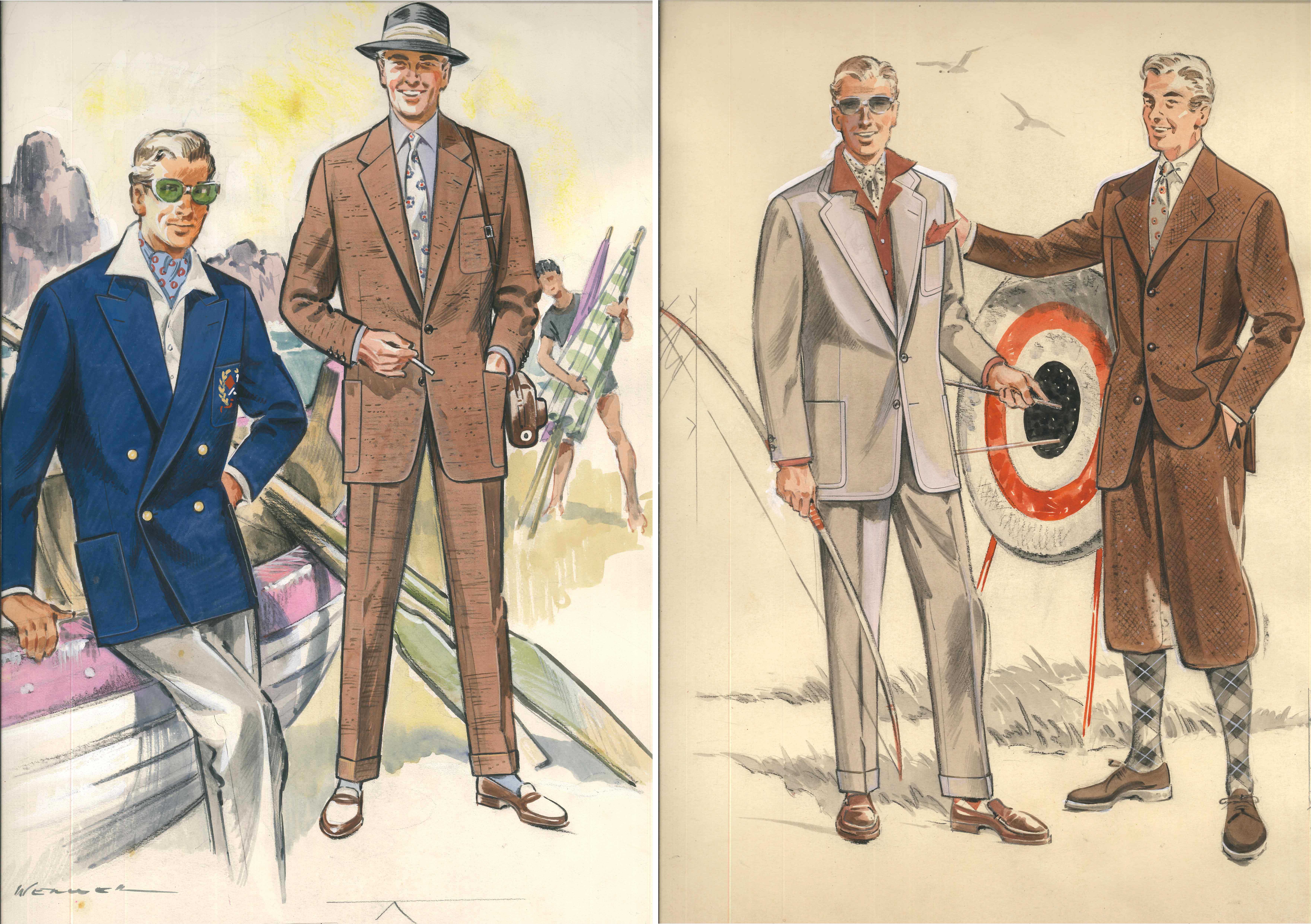
1950
In the 1950s, the patterns of jackets became wider again. After the war, the upper classes wanted to appear well-to-do, albeit fashionably conservative and not very experimental: men wore double-breasted jackets with two side slits. This trend came from England. Nevertheless, colourful ties and pocketkerchiefs were not to be missed in high society. Those gentlemen who were more fashionably oriented towards the United States emulated Frank Sinatra: they chose a black, grey or brown three-piece and combined it with a fedora. If you want to recreate the jackets from this decade, go for Azores Grey, Sicilian Grey, Aberdeen or Midnight Blue for the fabric. The sportier alternative to the jacket in the 50s was the Eisenhower jacket, a lightweight blouson with two patch pockets.
1960
The Sixties were marked by change: Double-breasted suits were history, John F. Kennedy was considered a fashion role model with his boxy suit. The young president established long, single-breasted jackets that barely had a waist. The solid fabrics of the time reinforced this effect. In the shoulder area, the jackets appeared both massive and broad, because light padding was used there so that the shoulder sloped slightly. The body was presented in a V-shape, the narrow lapel in combination with a thin tie supported this effect. Suits also became more affordable during this period, because with the advance of industrialisation, loose inserts were no longer used for the first time. Piquing was replaced by bonding with fixative fabrics. In addition, new materials such as polyester appeared.
1975/1980
It was actor Richard Gere who wore a suit by Giorgio Armani in the film American Gigolo, thus heralding the age of the Italian look. In the deconstructed jacket, the fashion designer dispensed with any reinforcement at the front and shoulder. Instead, the jacket was given its shape solely through the pattern and the dressing of the cloth. The wide suit in a box shape was worked with a small hem and had a narrow, deep-seated lapel. To this day, this type of finish is still convincing in summer jackets made of cotton or linen. However, deconstructed jackets in combination with the light materials can also lead to a sagging shoulder. In the 1970s, the jacket was worn separately from the suit for the first time. Young people in particular combined jackets with oversized fronts with white T-shirts. In the 80s, it was the young women who put on their fathers’ old dinner jacket jackets and gathered up the sleeves.
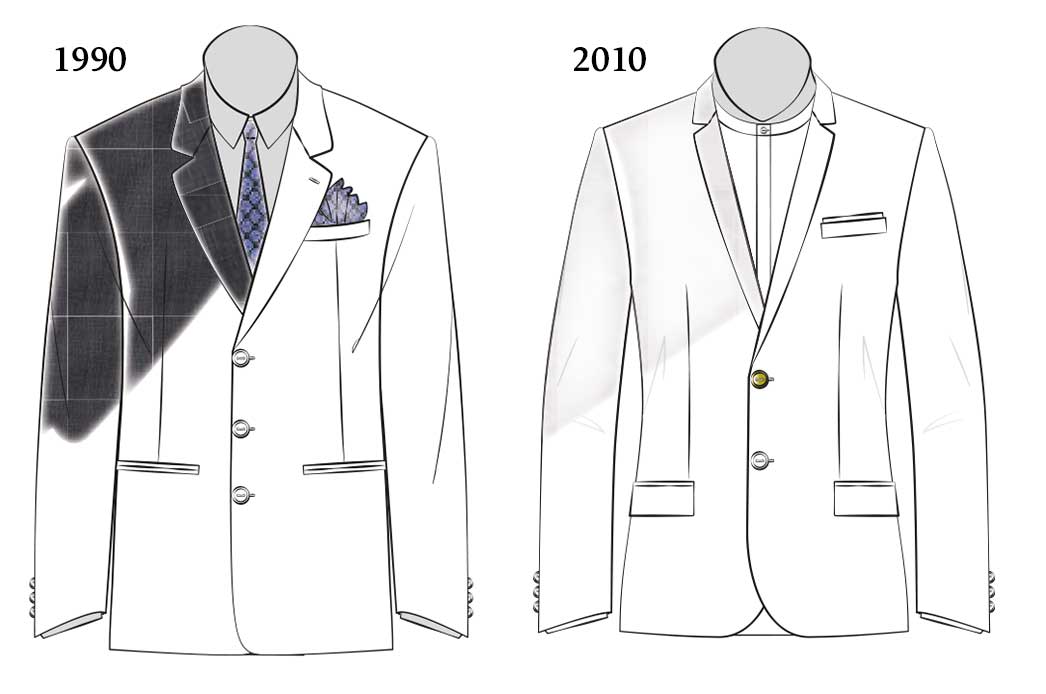
1990/2000
Shortly before the turn of the millennium, the suit and thus the jacket became less important. Young people in particular, who wanted to distinguish themselves from their parents’ generation, did not think of wearing a jacket. They tended to go for punk fashion made of black leather or dark denim. Suits were only worn on special occasions. Here, too, a boxy shape was created by means of a small cut-off. The large jacket, whose look was influenced by American styles at this time, was adorned with three to four fastening buttons, the top one sitting almost at waist level. The double-breasted jacket had a centre vent in the back so as not to be too rigid in its movement despite the enormous amount of fabric.
2010
Especially for their own weddings, gentlemen at this time often chose shadow stripes or glossy fabric e in silver-grey or in clear champagne tones. As a contrast to the bright, modern colours, grooms often opted for a traditional jacket shape with two buttons, which were often gold-coloured. Those who wanted to look particularly fashionable and young on the job wore an extremely short jacket with a length of 75 cm and two side slits.
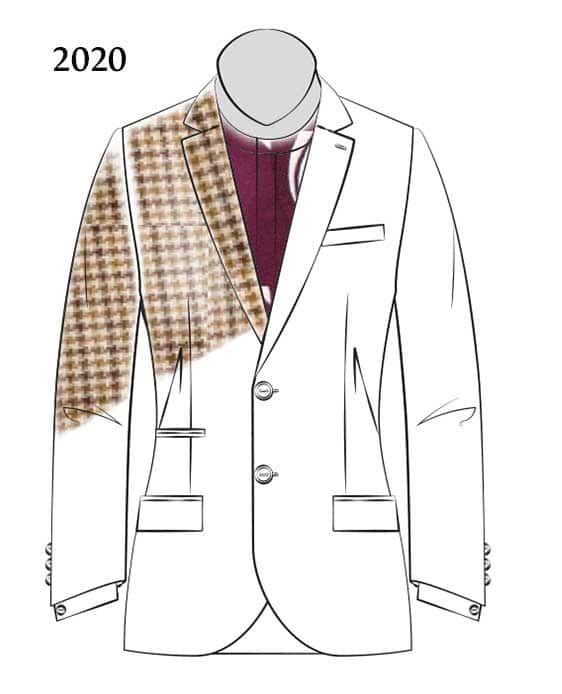
2020
And today? Today, anything goes: earlier trends are coming back and being reinterpreted. Young men in particular enjoy historical accessories such as the bow tie or braces, which they then combine with a sporty suit in a slim fit. The lapels are narrow, the jacket itself is fitted and body-hugging. The sleeves are comparatively shorter so that watches or cuffs can be visibly displayed. Modern jackets in navy or grey can be worn separately from suit trousers and instead combined with well-fitting jeans or casual chinos. There are almost no limits to the creativity of master tailors and customers.
Instructions for pattern construction of menswear and patterns for sewing jackets, suit trousers, waistcoats and much more can be found in our online shop.


